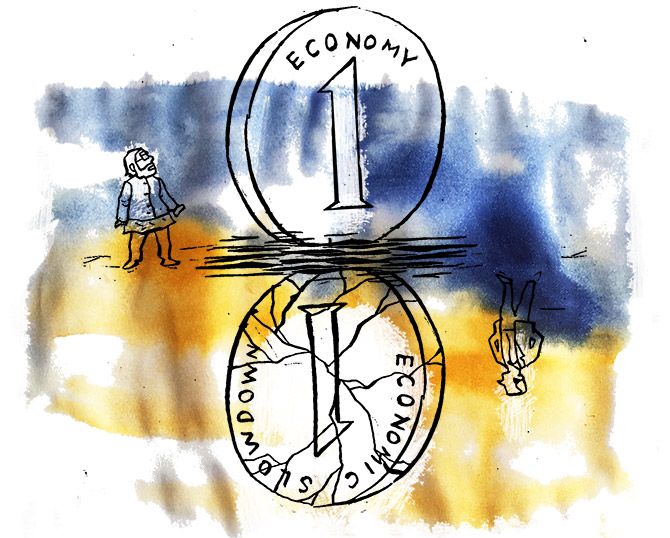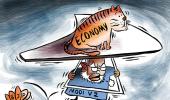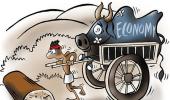'There are companies that are losing and there are companies that are rising.'
'And the companies that are losing are positioning it as an economic slowdown.'
Illustration: Dominic Xavier/Rediff.com

Amidst the tsunami of negative news about 30,000-40,000 mid-level employees working in major IT companies having lost their jobs, unemployment having risen for the first time in 45 years, and GDP growth going south, Manish Sabharwal, chairman and co-founder, Teamlease Pvt Ltd, sounds like a ray of positivity.
Sabharwal, a product of the Wharton Business School, founded Teamlease in 2002. Today, it is India's largest human capital firm with 175,000 employees in 4,000 cities. The company has hired 1.7 million employees in the last 10 years.
Four years ago, it opened a vocational university, Teamlease Skills University, which trains 100,000 students, in a partnership with the Gujarat government.
Other than being an entrepreneur, Sabharwal is an astute observer of corporate India and its impact on society and economy. He predicted the migration of labour from the north to the south long before it happened.
"People who are complaining are the ones from the old corporate India. It is like animals bred in captivity will find it hard to live in a jungle," Sabharwal, below, tells Rediff.com's Shobha Warrier in the first of a two-part interview.
From jobless growth to slow growth to unemployment. Is this the story of the last five years in India?
I don't think unemployment has gone up; it has been the same since 1947 -- between 5% and 7%. So, unemployment going up from 5 ½% to 6% is not a big deal. Yes, 6% is a problem, but our biggest problem is not unemployment, but employees's poverty. 26% of our labour force lives in poverty.
In my opinion, productivity matters more than jobs.
The Bhagavat Gita says what stands between us and our goals is not obstacles, but clearer paths to lesser goals.
In my opinion, jobs are lesser goals than wages. Wages are the higher goal here; jobs are easy to create, but those jobs do not pull you out of poverty. That’s what has happened in the last 50 years.
The current transformation of India which is formalisation, urbanisation, industrialisation and financialisaton may create short term pain, but it has long term gains.
Nobody can deny that there is some short-term pain in corporate India. But it is not true to say there is mass unemployment.
In the 1950s or the 1960s, (Nobel Prize winning economist) Milton Friedman came to Delhi and wrote a letter to the prime minister (Jawaharlal Nehru): 'My worry with your model is that your capital will be handicapped without labour and your labour will be handicapped without capital.
Fifty years down the line, what he said turned out to be true. We have lots of enterprises with lots of labour with no capital, and we have 19,500 companies with a paid-up capital of more than Rs 10 crore with no labour.
The structural transformation which is happening in India is creating a little bit of cyclical stress on corporate India, but we will come out of it stronger.
You said corporate India is facing short term pain right now. What are the reasons for this pain?
There are all kinds of reasons. One is, there is a massive slowdown globally. In trade, there is a slowdown. In credit, there are challenges. People are still getting used to GST. The banking system is changing. Bankruptcy is a completely new thing.
Credit to GDP ratio in India is only 50% while it should be 100%. Yes, the 300% credit to GDP ratio in China is a problem.
In a nutshell, banking reforms, GST reforms, global headwinds... There are many components which are affecting the current slowdown.
But the pluses are, there is structural reform, low inflation environment, and a huge increase in private equity in the last 2-3 years. It is almost around $200 billion to $300 billion.
So, traditional sources of financing have been replaced by more formal sources.
Whenever change happens, the old die faster than the young is born. For example, entrepreneurs who have borrowed their equity, entrepreneurs who have over-lived.
This is not passing showers for corporate India; it is climate change.
 Gloomy reports of an impending restlessness in society are creating a panic. How long do you think the climate change will last?
Gloomy reports of an impending restlessness in society are creating a panic. How long do you think the climate change will last?
I have been hearing the same story every year for the last 15 years!
Historians warn against a disease called presentism, that today's circumstances are so unique!
There is a divergence between the old corporate India and the new corporate India. It is clear that new corporate India is not suffering; e-commerce companies are massively expanding and consumer durable companies are also expanding.
So, the story that all companies rise and fall at the same time is an old Indian story. Now, there are companies that are losing and there are companies that are rising.
And the companies that are losing are positioning it as an economic slowdown.
There was a time when economies were regulated and socialism was capitalism without competition and bankruptcy. And when there is competition and when there is bankruptcy, there will be some people losing because of competition, and complaining.
People who are complaining are the ones from the old corporate India. It is like animals bred in captivity will find it hard to live in a jungle.
I would say this is a climate change for corporate India and not a passing shower. There will be short term pain for long term gains.
When India first liberalised, many Indian companies were nervous and wanted the government to protect them as they were scared to face global companies...
Yes, that was true for the old corporate India.
Do you feel changes are happening faster now, faster than the earlier decades making the old corporate India jittery?
Absolutely. One of the biggest mistakes we made in 1991 was not to include formality, banking reform and corruption. Now that we have expanded the definition of reforms and include formalisation, banking reforms and corruption, it is judgement day for many people who did not have to face the reality then.
Bankruptcy does not allow postponement of the problem which is never good because it comes back with compound effect. I would say you have to look at many companies that are doing well and many companies that are doing badly.
The short-term structural changes like formalisation, bankruptcy and GST can create short term pain, but they are good for long term gain.
It is too complex to come to the conclusion that there is a downturn and everybody is suffering. Some people are not happy with the current environment.
But we are happy with the current environment, and I know many new Indian companies are happy with the current environment.
Shobha Warrier covers business for Rediff.com. She is the author of Dreamchasers: Entrepreneurs from the South of the Vindhyas. 2017.
She can be contacted at shobhaw@rediff.co.in










